Yamhill Advocate has been provided a cache of documents received as part of a public records request on communications from within the Newberg school district. There is a large volume of documents to sort through still but I wanted to share this with the residents of Newberg, as it pertains to issues being debated and discussed by the Newberg school district board.
This article will be an editorial, as I will share some of my opinions on the communications in order to provide some further context to them. All of the legal disclaimers from my previous articles apply to this article, too.
A Letter From School Attorney Lisa Freiley to Superintendent Joe Morelock
Among the documents that were released is what appears to be priviledged attorney-client communications. I am unsure of precisely what the laws are with attorney-client communications and public record requests but it’s my understanding they are usually heavily redacted when discussing issues related to potential lawsuits, such as has been threatened by the Newberg Education Association, the local teacher’s union. Yet, these documents are not redacted. Whether it is a mistake or intentional to release it so unaltered, it is what it is. I am grateful that we can discuss the documents in their unaltered states, as it helps provide more clarity for the public about this public issue.
What follows here is a copy of one such document, a September 27th letter that was sent to Newberg school district superintendent Joe Morelock by Lisa Freiley, an attorney with the Willamette Education Service District which provides services to the Newberg public school district as the ESD for Yamhill County. The letter concerns the ban on politically divisive symbols that the Newberg school board conservative majority desired to and has since implemented.
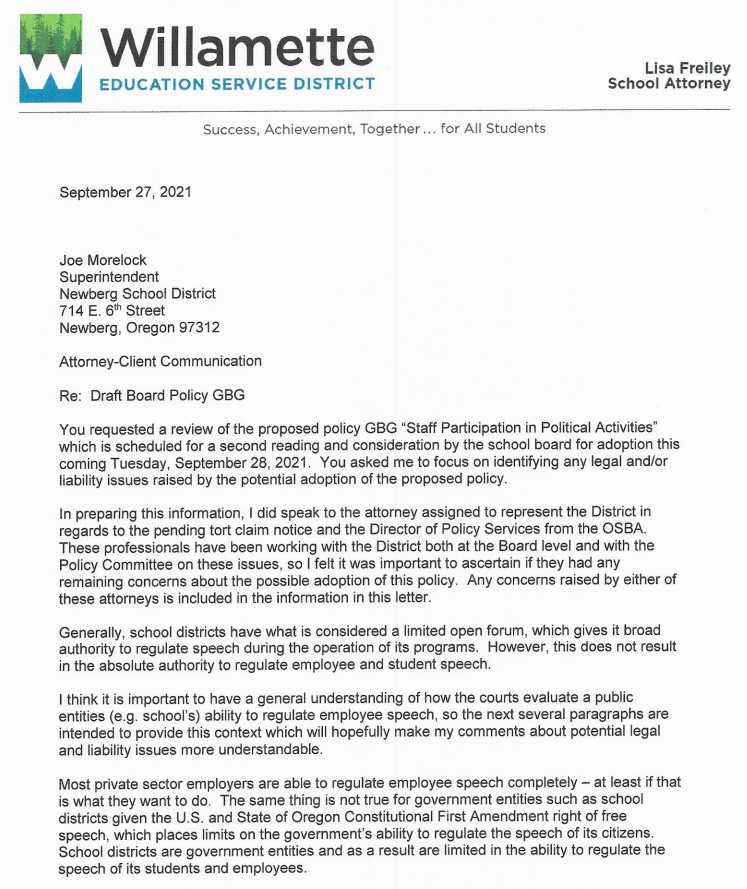
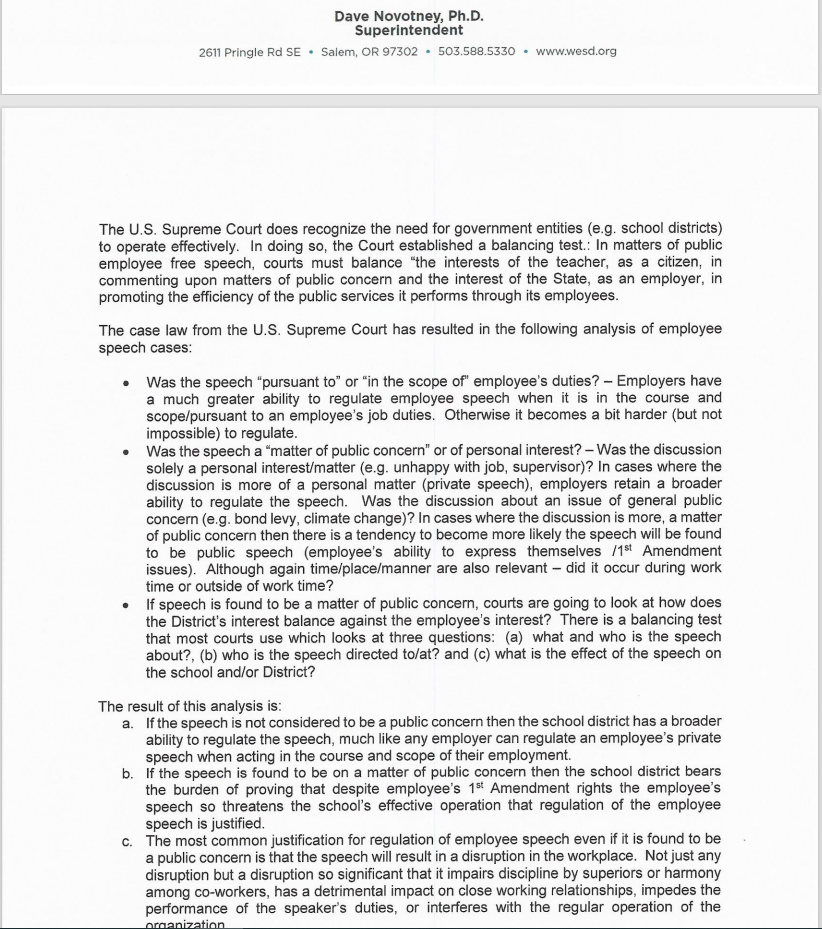
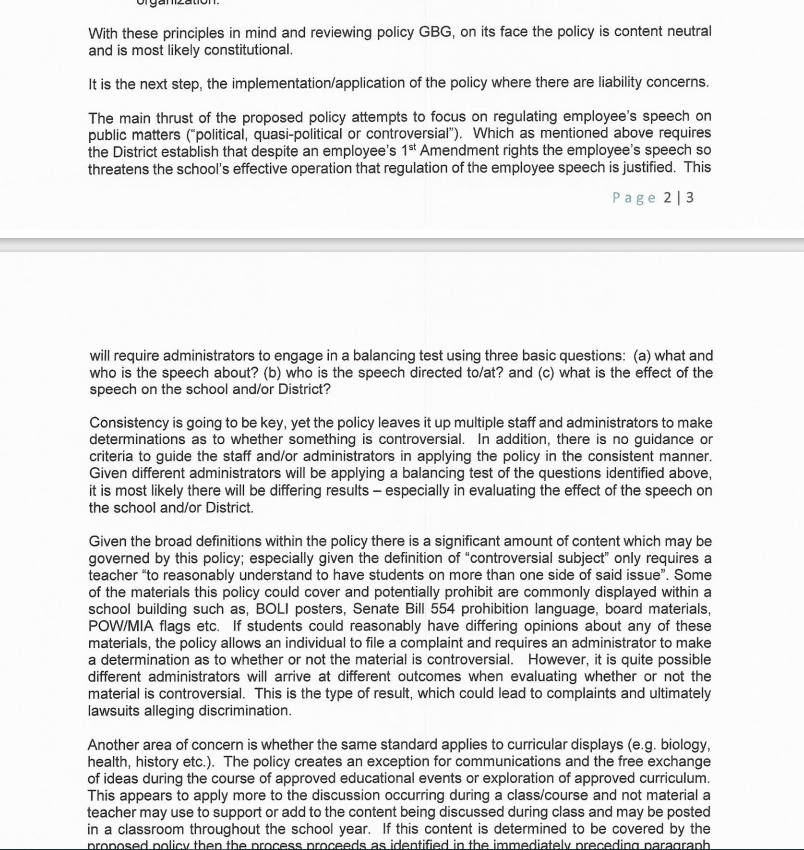
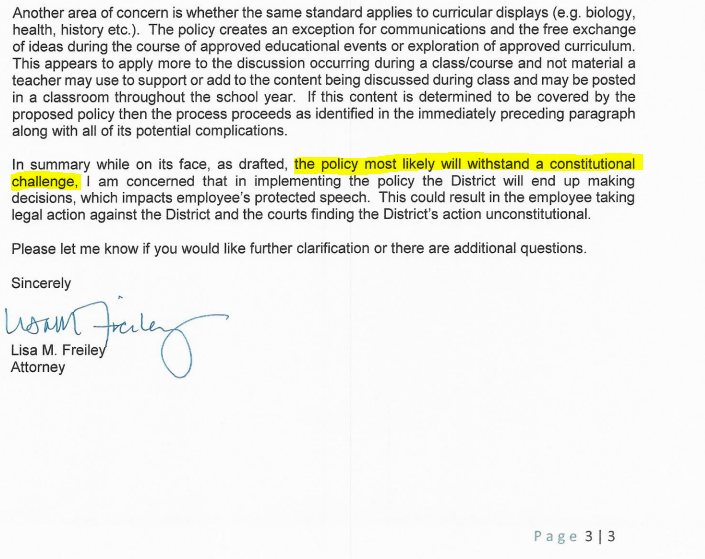
There is a lot to unpack here but I wanted to take the time to point this part out,
“The policy most likely will withstand a constitutional challenge, I am concerned that in implementing the policy the District will end up making decisions, which impacts employee’s protected speech.”
This will be relevant to the next section.
Examining Laws Related to Limitations of Free Speech on School Campuses
Now, I’m not an attorney but I do disagree with some of the viewpoints that Freiley has shared and I am going to discuss this, even if it might look that I am challenging her credibility, which would extend to her opinion of the constitutional stability of the policy. Yet, I agree that the policy is probably constitutionally valid, and instead I am questioning her conclusions about the right of public employees to engage in political activism in the workplace.
Freiley has formed her opinions about the constitutionality of the policy and the constitutionality of the implementation of the policy separately using different case law, but I realize some people may find it a simple overall credibility issue. It is not my intent to make Freiley’s views appear to lack credibility. Nevertheless, I think it’s important to have a conversation about this and discuss the laws I think are relevant to the topic.
I do agree that the specific way that a policy is implemented by any agency can be prone to mistakes made in specific applications of the policy. This is true of any policy, and it is why care must always be taken in the administration of any rule that has the potential to infringe upon a person’s rights. What I disagree with Freiley on is that public employees have greater rights to political speech than private employees do. While many privately employed individuals are subject to “at will” contracts and can be terminated for no reason, this does not mean the same thing as “any reason”. There are laws that prevent private employers from terminating employees based on factors such as being reserve military called to service or because they voted a certain way. Private companies do have enormous discretion to fire at will contract employees for many reasons, yet this also means that they have enormous discretion to decide what employees will and won’t be fired for. Many private companies allow employees to be deeply involved in political campaigning, even while at work and sometimes even using the business’ resources to do so.
By contrast, public employees’ conduct is tightly regulated and little discretion exists for managers to make personal decisions on whether or not someone will be punished; the rules decide, not the managers. Public unionized employees are more difficult to terminate compared to at will contract private employees. Public employees require a just cause for termination, per these rules. However, this does not mean they have free reign to engage in political activism in the workplace, such as a school campus and classroom they are working in as a teacher.
As I have previously written in my first article expose about the activities of Newberg Equity in Education, Meet the Newberg, Oregon Mafia Led by Elected Officials and Other Community Leaders, I pointed out laws such as ORS 260.432 Solicitation of public employees, which specifically states that a public employee may not, while on the job during working hours, promote or oppose election petitions, candidates, political committee or ballot measures. Freiley does not mention this law at all in her letter, so whether she factored it in to her opinion is unknown to me.
In Oregon, as in most states, there are state enforced limits on political speech that public employees can engage in during their work hours. Teachers are public employees, as school districts are a quasi-municipal corporation. As such, they are public employees and their political speech during work hours is limited by laws such as ORS 260.432.
While the law says that employees may express personal political views, they have a restriction on this kind of speech during work hours and while working in their capacity as public employees. This is very clear and straight-forward.
Furthermore, the Hatch Act is also applicable to employees of the Newberg school district because the district is the recipient of federal funding. As I pointed out in the sub-section of the ‘Meet the Newberg, Oregon Mafia‘ article, How Newberg Public School District Teachers in NEEd Are Violating the Hatch Act, the Hatch Act does apply to wearing Black Lives Matter t-shirts in some circumstances if the intention of wearing them is to advocate for or against certain political activities. This is specifically discussed in a memo issued by the US Special Council that administrates the Hatch Act.
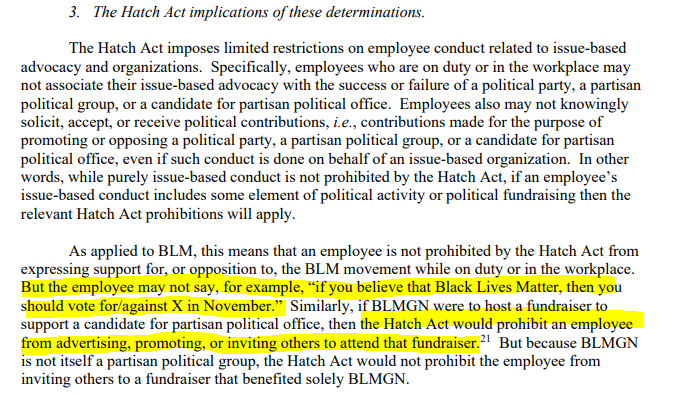
This, again, is yet another limitation that teachers have on their freedom of speech while they are working in their capacity as teachers.
Both the federal and state law is very clear; public workplaces such as schools are NOT a place for recruiting others into your political activism.
I also find it peculiar that Mrs. Freiley did not expressly mention Supreme Court decision Hazelwood School District v. Kuhlmeier, which is probably the most relevant constitutional law at the heart of the school ban. This decision upheld the right of school districts to censor speech in order to set high standards for student speech disseminated using the school resources, and that schools retained the right to refuse to sponsor speech that was inconsistent with “the shared values of a civilized social order.'” The Court further ruled that educators do not offend the First Amendment by exercising control over the content of student speech, so long as this control is “reasonably related to legitimate pedagogical (related to teaching) concerns.” This ruling would apply to a district restricting the hanging of posters and flags with political symbolism on them in classrooms and elsewhere on the campus.
A previous Supreme Court case, Tinker v. Des Moines Independent Community School District, ruled that administrators should seek to prove that substantial disruption of school activities was likely or has occurred to justify any censorship of student speech. This is often referred to as the ‘Tinker test’.
It is also worth mentioning that Dariano v. Morgan Hill Unified School District, a case in the the U.S. Court of Appeals for the Ninth Circuit (which has appellate jurisdiction over Oregon) used the Tinker test to determine a California-based school district did not violate the First Amendment when the school district banned American flag branded clothing and other items during a Cinco de Mayo celebration, as in the previous years the wearing of this clothing had resulted in fights between students wearing American flag branded t-shirts and other students, in particular those who were members of rival street gangs.
One might assume that, based on the case law, if the U.S. Court of Appeals for the Ninth Circuit would uphold a school district banning the wearing of American flag branded clothing for being a trigger for conflict between students, then certainly a district prohibiting other flags (such as the pride flag and Black Lives Matter flags) which have created disruptive conflicts would also be upheld as well.
The Activities of Newberg Equity in Education May Already Pass the ‘Tinker Test’
Freiley does not mention it in her letter, but my personal assessment of the school board’s complaint driven policy is that it is designed to pass the Tinker test by demonstrating that a disruption of school activities is occurring, using the event of someone complaining about the display of politically divisive symbols to provide proof that a disruption is occurring.
I’m not sure if this approach is necessary. In my opinion, the Tinker test has already been passed and my prior articles have the evidence for this.
I believe that the sheer fact that so many of the teachers in the school district have participated in a group like Newberg Equity in Education (NEEd) is the evidence that the Tinker test standard already has been met.
Let me explain.
The primary stated objective of Newberg Equity in Education (NEEd) is to indoctrinate children of the district into Critical Race Theory as part of a plan to “dismantle and rebuild” America, as admitted to by Guadalupe Martinez Zapata, Vice-Chair of the Oregon Department of Education, in her communications within the NEEd group while posting on the user account “Lu Pita”.
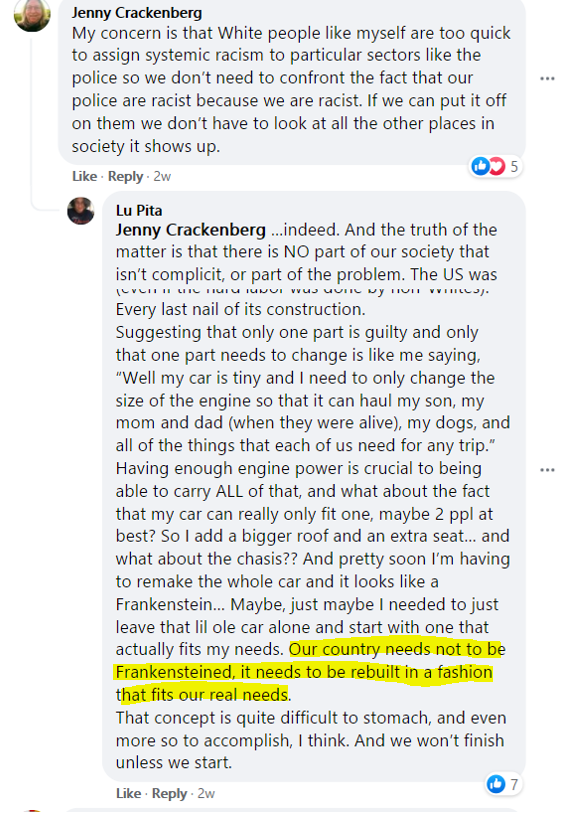
As shown in the sub-section, Newberg Equity in Education Exists For Teaching Critical Race Theory to Kids, NEEd founding member and administrator Beth McDonough Woolsey makes it clear that the group’s purpose is to get Critical Race Theory into the Newberg public school district curriculum,
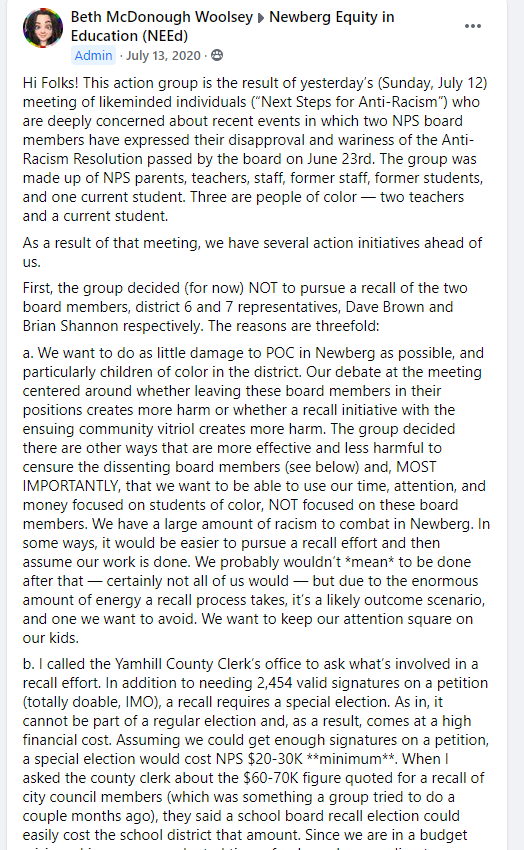
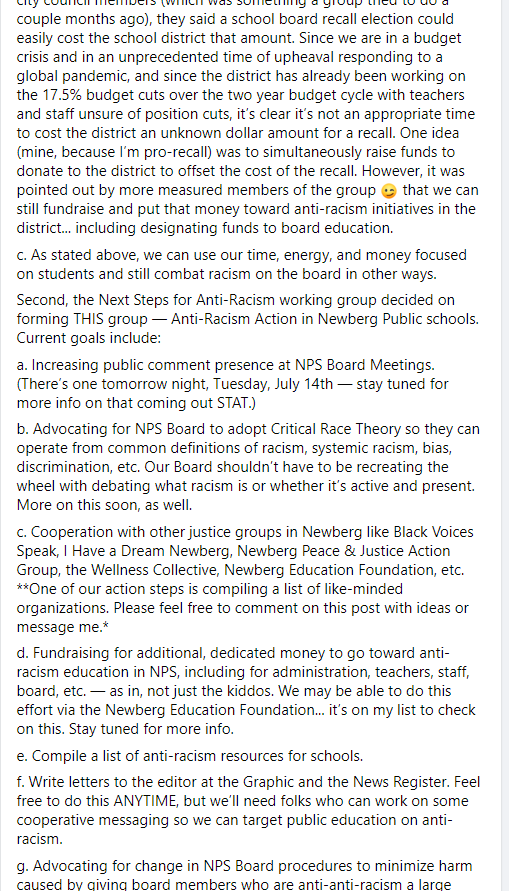
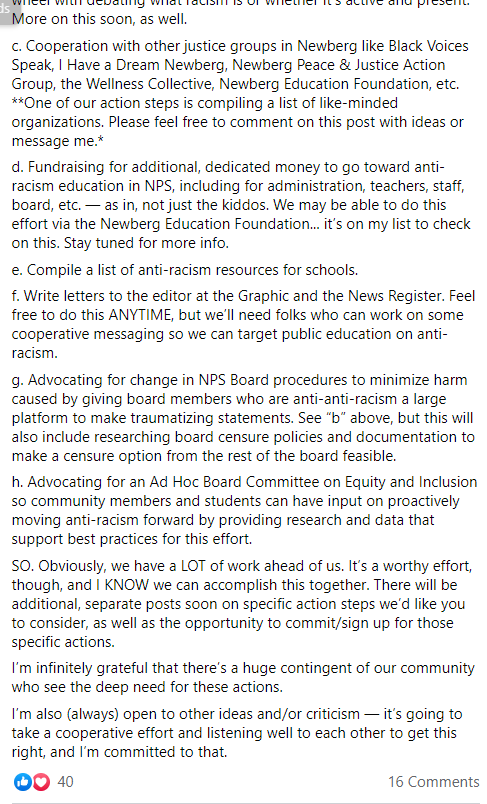
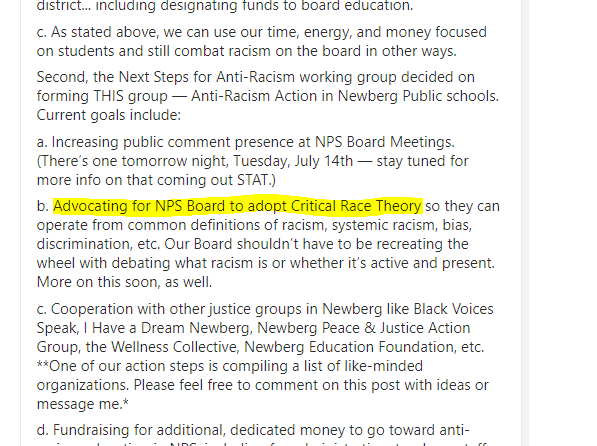
Furthermore, in the sub-section, What Critical Race Theory Beliefs Cause Teachers and Parents To Do, the consequences of this ideology is shown to have resulted in the implementation of racial segregation and even school counselors championing selective special treatment of students by the school based on their ethnicity, in utter defiance of Supreme Court decision Brown v Board of Education and the Civil Rights Act of 1964.
There is also the organized illegal intimidation and harassment of Newberg school board directors Dave Brown, Renee Powell, Brian Shannon and Trevor DeHart for attempting to ban the political symbols the group holds dear from the schools, as shown in subsection of Part 1, Evidence of Coordinated Efforts by the Mafia to Intimidate School Board Members To Change Their Voters or Resign and Why the Newberg Mafia is an Actual Mafia Per RICO.
Finally, Newberg Equity in Education is itself a subservient group to Progressive Yamhill, whose political activism is apparent and obvious given it is controlled by a political party, as detailed at length in Part 2: Meet Progressive Yamhill, the Parent Group of the NEEd Mafia Seizing Control of the County. One of the main leaders of the group is Megan Corvus, a self-admitted racist, and who is the Recording Secretary of the Yamhill County Democrats, the local Democratic party chapter here in Yamhill County, Oregon. All of their political candidates for office are in the Progressive Yamhill group she administrates, as detailed in subsection of Part 2, List of Identified Elected Politicians and Other Key Political Activists.
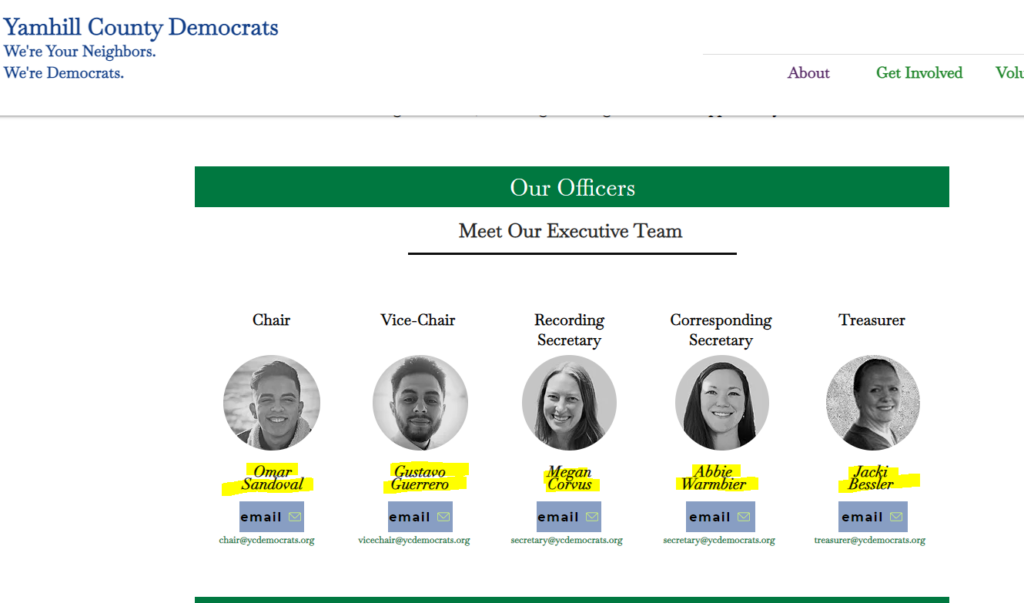
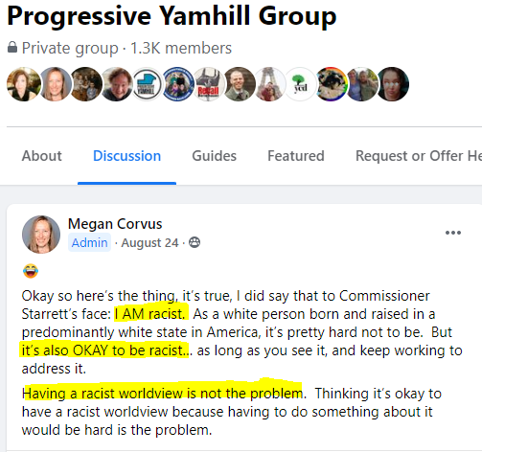
And to those who think I somehow quoted her out of context or that I might have fabricated this screenshot, you can now go read her public acknowledgement and ownership of this statement in a public Facebook group where she responded to me when I asked her to clarify her statement. I am not making this up.
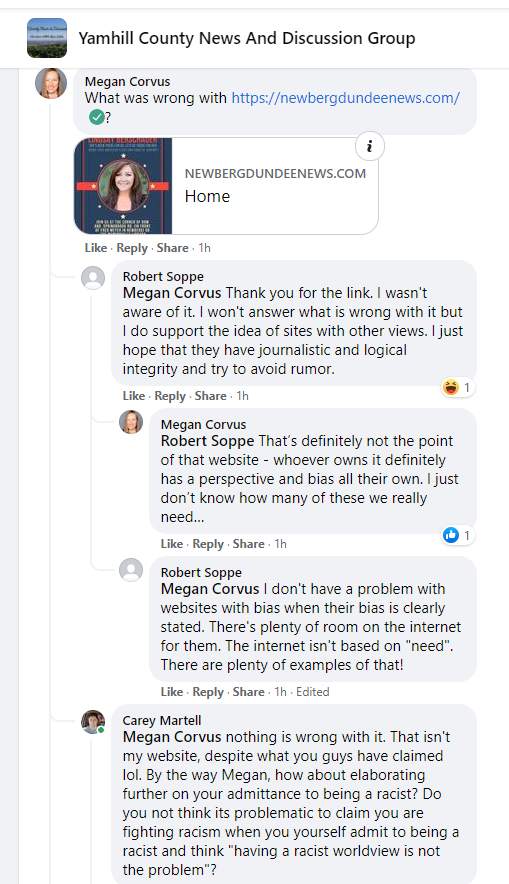
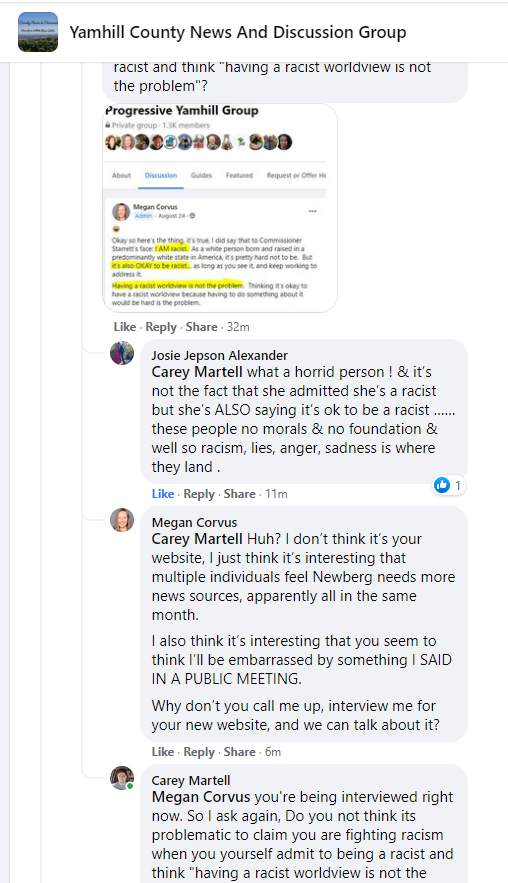
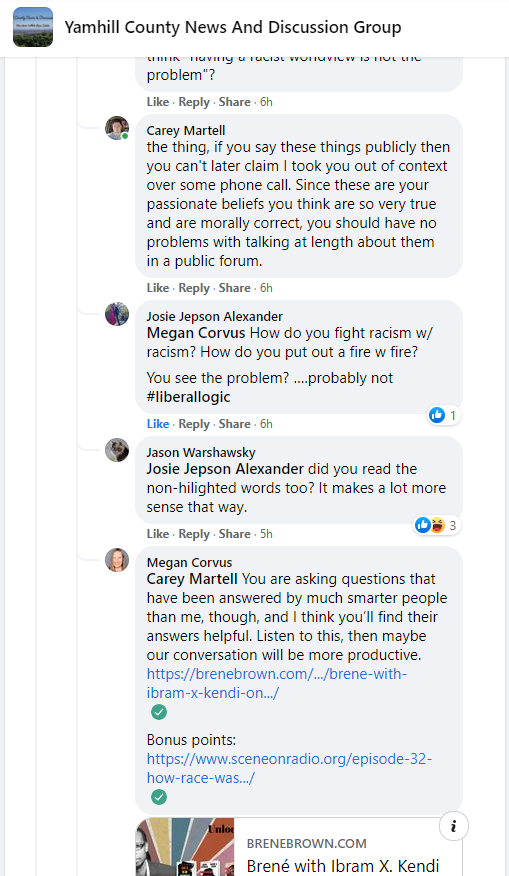
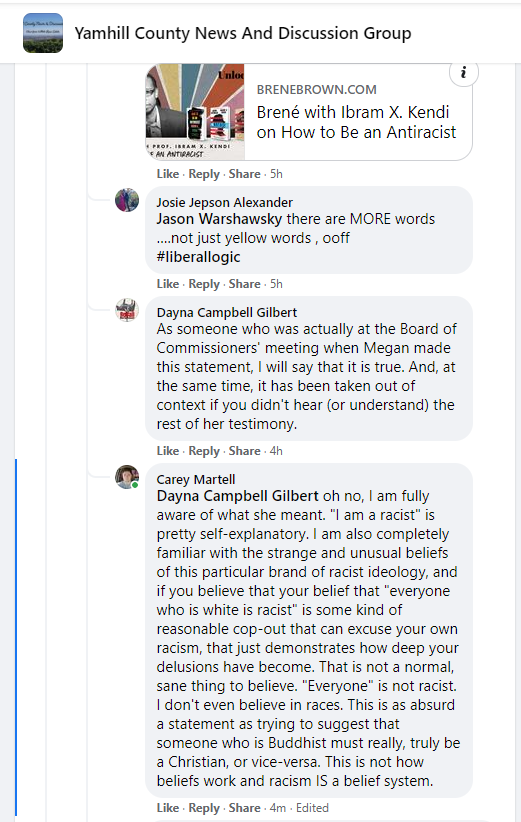
Therefore, in my personal opinion, evidence that the Tinker test conditions have been met is already demonstrated. No complaint driven process is necessary; the evidence is plain as day.
Having said all of this, it will be up to the members of the Newberg school board to decide how to use this information to determine the future implementation of the school board’s policies. As I am not an attorney, these are merely my own opinions informed by what I have read of the law as a hobby interest over the years and what I have researched in my investigation of writing these reports. My musings here should be reviewed by a credible attorney who specializes in constitutional law, before any policy decisions are made.
I hope that this article has provided further clarity and information for the residents of Newberg, Oregon regarding this matter.


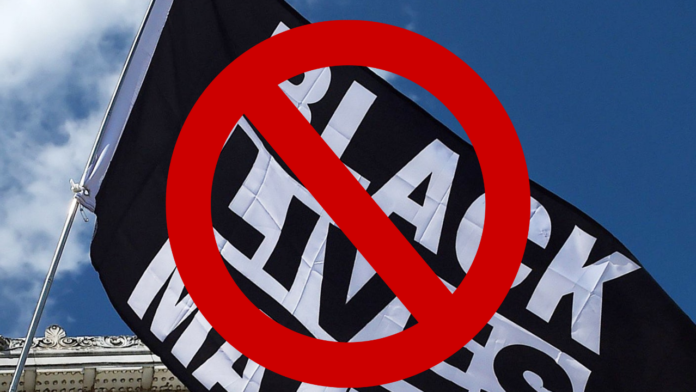


Thank you for all of this information.
You’re welcome.
great job getting this document, i hope to see many more like it! can you request copies of all documents relating to this policy, including any internal discussions, communications coming in from the public, etc?
https://www.aclu-wa.org/docs/free-speech-rights-public-school-teachers-washington-state is the best overview of the legal issues i’ve seen, but still neglects to emphasize the state’s interest in preventing even the appearance of compelled indoctrination, which freiley doesn’t even touch on. her point that inconsistent application will open up lawsuits is spot on though. IANAL but i don’t know of any examples where the first amendment was held to apply to any employee at work, public or private.
a neighboring school district’s GBG doesn’t have an AR (so enforcement mechanism is unspecified), but is nominally just as effective at addressing what newberg school board is trying to do: “All employees of the district are privileged within the limitations imposed by state and federal laws and regulations to choose either side of a particular issue and to support their viewpoints as they desire by vote, discussion, or the persuasion of others. Such discussion and persuasion, however, will not be carried on during the performance of school duties, except open discussion during classroom lessons that center on a consideration of all candidates for a particular office or both sides of a particular political or civil issue. On all controversial issues employees must designate that the viewpoints they represent on the issue are personal viewpoints and are to emphasize that these viewpoints are not to be interpreted as the official point of view of the school district.”
they have a policy INB that is also relevant and i think well considered, but enforcement is again not specified: “Teachers will present both sides of controversial issues and guard against giving their personal opinions until students have had an opportunity to find, collect, and assemble factual material on the subject; to interpret the data without prejudice; to reconsider assumptions and claims and to reach their own conclusions. By refraining from expressing personal views before and during the period of research and study, the teacher will encourage students to search after truth and to think for themselves. The development of an ability to meet issues without prejudice and to withhold judgments while facts are being collected, assembled, weighed and relationships seen before drawing inferences or conclusions, is among the most valuable outcomes of a free educational system. Emotional criticism and the promotion of a cause within the classroom are inappropriate and unscholarly. The teacher’s attitude will be that of the true scholar, which is truth-seeking, open minded and tolerant.” https://policy.osba.org/sherwood/I/INB%20D1.PDF
i had submitted a comment recommending https://kappanonline.org/underwood-school-districts-control-teachers-classroom-speech/ as a really nice overview of the case law, short and very readable with direct quotes, establishing that teachers don’t have first amendment protection at work. can you provide a comment policy that would explain why it was not approved?
i did find that the famous tinker quote that “students don’t lose their first amendment protections at the school house gates” did apparently also include teachers in that statement, but afaict none of the argument/analysis actually touched on teachers. https://en.wikipedia.org/wiki/Tinker_v._Des_Moines_Independent_Community_School_District#Majority_opinion
it has to be the most egregious failure of media i’ve ever seen that all of the reports on this policy left readers with the impression that the ban applied to students, when shannon was clear from the very first discussion that it did not. i think that should be really emphasized as why this new paper is needed.
Any comments to this website that include links must be manually approved, due to spam. I will see them, don’t worry about that.
ah ok, thanks for the clarification. some of mine were showing up and some weren’t (the ones with links i guess), so i thought they were moderated. you can delete the duplicates if you want. i do recommend posting your moderation policy and specifying for any that don’t pass which part they violate, at least while volume is manageable. it’s a high road that many won’t expect, the opposition will naturally assume the worst of a site like this until proven otherwise. you may also consider publishing how much income it generates and pledging some or all of it to some cause — like legal funds for pursuing these issues etc. people will try to find every reason to dismiss it without evidence to the contrary.
https://kappanonline.org/underwood-school-districts-control-teachers-classroom-speech/ short and clear, cites several quotations from case law establishing teachers don’t have first amendment protection while teaching